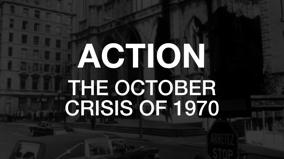New release
Coming
None
Reaction: A Portrait of a Society in Crisis
1973
57 min
Leaving soon
This feature documentary gives voice to various English-speaking groups in Montréal and other places in Québec as they react to the October Crisis of 1970, when Québec nationalism took a violent turn. A British diplomat had been kidnapped, a Québec cabinet minister murdered. The troops were brought in as a safeguard. This film is a vigorous reflection of the discussions and analyses of the situation that went on wherever people gathered, voicing attitudes and fears, sympathies and concerns.

Details
This feature documentary gives voice to various English-speaking groups in Montréal and other places in Québec as they react to the October Crisis of 1970, when Québec nationalism took a violent turn. A British diplomat had been kidnapped, a Québec cabinet minister murdered. The troops were brought in as a safeguard. This film is a vigorous reflection of the discussions and analyses of the situation that went on wherever people gathered, voicing attitudes and fears, sympathies and concerns.
-
directorRobin Spry
-
producerTom DalyNormand CloutierRobin Spry
-
photographyDouglas Kiefer
-
animation cameraSimon Leblanc
-
soundHans OomesJohn Yanyck
-
editingShelagh Mackenzie
-
sound editingBernard Bordeleau
-
re-recordingJean-Pierre JoutelMichel Descombes

















